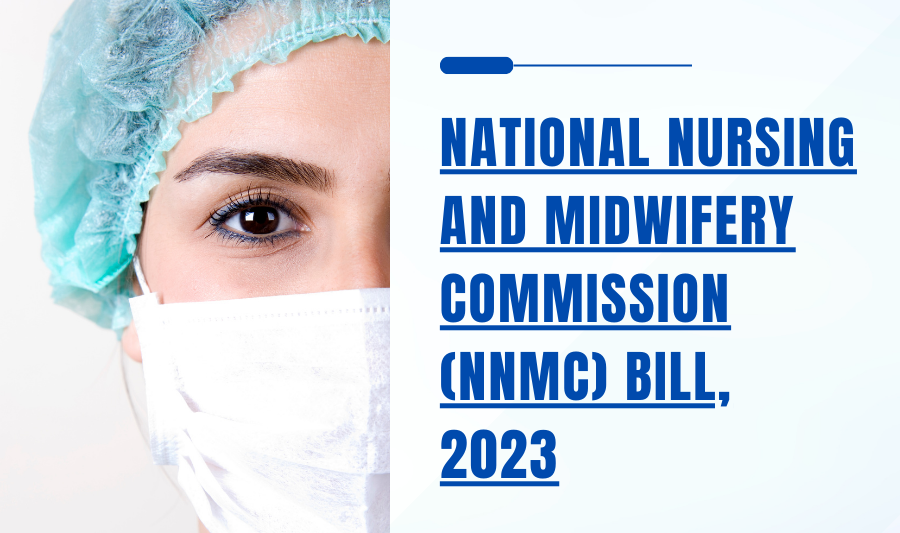Introduction
Parliament has passed the National Nursing and Midwifery Commission (NNMC) Bill, 2023 which received the President’s assent on 12th August, 2023. This Bill after being published in the Gazette of India becomes an Act that will replace the existing Indian Nursing Council Act, 1947, to incorporate the latest scientific advancements and reflect the current needs and demands of the nursing and midwifery profession.
Objective
It aims to:
- Enhance standards, professionalism, transparency, and accountability in the nursing field.
- Provide for regulation and maintenance of standards of education and services by nursing and midwifery professionals.
- Maintenance of a National Register and State Registers and creation of a system to improve access, research and development
- Establish the National Nursing and Midwifery Commission (NNMC) as a regulatory body for nursing and midwifery professionals.
National Nursing and Midwifery Commission (NNMC)
Composition:
- NNMC will consist of 29 members i.e., 1 Chairperson, 16 ex officio members and 12 other members selected from a prescribed category as per Section 4 of the Act.
- Chairperson must hold postgraduate degree in nursing and midwifery and 20 years of field experience.
- Ex-officio members must be from Department of Health and Family Welfare, National Medical Commission, Military Nursing Services, and Directorate General of Health Services.
- Other members are to be nursing and midwifery professionals and/or from charitable institutions.
Functions:
The functions and powers of the Commission are laid down in Section 10 and are as follows, in brief:
- frame policies and regulate standards for the governance of nursing and midwifery education and training;
- regulate nursing and midwifery institutions, researches, professionals and associates;
- identify and regulate any other category of nursing and midwifery profession;
- provide basic standards of education, physical and instructional facilities, assessment, examination, training, research, continuing professional education and maximum tuition fee payable in respect of various categories;
- provide standards for nursing and midwifery faculty and clinical facility in teaching institutions;
- provide for a uniform mechanism for admission into the nursing and midwifery institutions at various levels.
Autonomous Boards
These are envisaged under Section 11:
- Nursing and Midwifery Undergraduate and Postgraduate Education Board:
- Regulate education and examination at undergraduate and postgraduate levels.
- Nursing and Midwifery Assessment and Rating Board:
- Provide the framework for assessing and rating nursing and midwifery institutions.
- Nursing and Midwifery Ethics and Registration Board:
- Regulate professional conduct and promote ethics in the profession.
State Nursing and Midwifery Commissions
- These are to be constituted by State governments under Section 23.
- They would consist of 10 members, including representatives from the health department and nursing/midwifery colleges.
- Functions include enforcing professional conduct, maintaining state registers, issuing certificates of specialization, and conducting skill-based examinations.
Nursing and Midwifery Advisory Council
This is envisaged under Section 34 of the Act:
- Provides advice and support to the National Commission on Nursing and Midwifery education, services, training, and research.
- Includes representatives from each State and Union Territory, Ministry of Ayush, University Grants Commission, National Assessment and Accreditation Council, Indian Council of Medical Research, and nursing/midwifery professionals
Practicing as a Professional
- Requires a license and to be registered with any of the State Commissions or, as the case may be, the National Commission.
- Eligibility: Any person having a recognised nursing and midwifery qualification shall have his name and qualifications enrolled in the National Register or the State Register for Nursing and Midwifery Professionals, as the case may be, and shall be granted a licence to practice as per Section 26.
- Non-compliance may result in imprisonment that may extend up to one year or a fine that may extend to five lakh rupees.
Miscellaneous
- Every University and nursing and midwifery institution governed under this Act has to maintain a website displaying on its website information required by the National Commission or an Autonomous Board.
- Students enrolled for a degree, diploma or certificate in any nursing and midwifery institution before the commencement of this Act, will continue to so under the existing syllabus and guidelines.
- Institutions are required to provide instructions and examination in accordance with the syllabus and studies as existed before commencement of this Act, and students will be awarded degree, diploma or certificate upon completion of his course.
- Even if the Indian Nursing Council Act, 1947 has been repealed, the educational standards, requirements and other provisions of the said Act and the rules and regulations made under it will continue to be in force and operate till new standards or requirements are specified.
Conclusion
The passing of National Nursing and Midwifery Commission Bill 2023, signifies a major step towards elevating nursing education and practice standards, fostering innovation, and enhancing collaboration across the healthcare sector. It is a crucial milestone that underscores the government’s commitment to nurturing a highly skilled and competent nursing workforce, thus ensuring the delivery of quality healthcare services to the nation.

